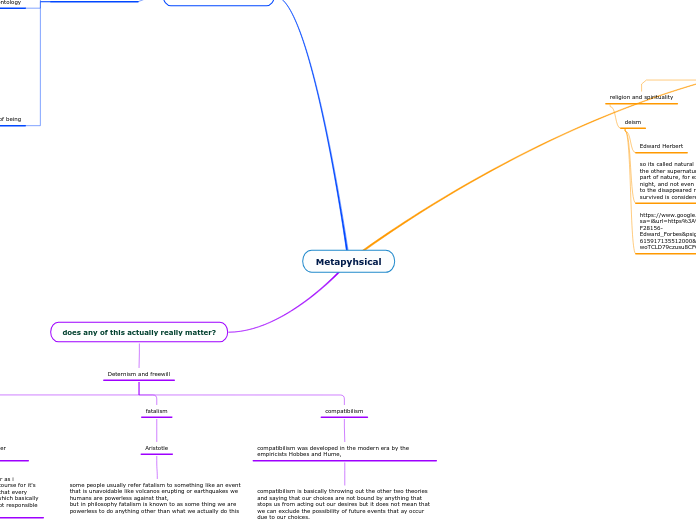por Don Jimenez hace 4 años
265
Metapyhsical

por Don Jimenez hace 4 años
265

Ver más
compatibilism was developed in the modern era by the empiricists Hobbes and Hume,
compatibilism is basically throwing out the other two theories and saying that our choices are not bound by anything that stops us from acting out our desires but it does not mean that we can exclude the possibility of future events that ay occur due to our choices.
http://www.alevelphilosophy.co.uk/handouts_ethics/FreeWillCompatibilism.pdf "Someone may choose to act as they do, but be motivated by a compulsion or addiction. For example, if I am addicted to smoking, there may be times when I feel I have to have a cigarette – I can't chose not to. Yet it would still be true, that if I did chose not to, then I wouldn't." (Lacewing, 3).
Aristotle
some people usually refer fatalism to something like an event that is unavoidable like volcanos erupting or earthquakes we humans are powerless against that, but in philosophy fatalism is known to as some thing we are powerless to do anything other than what we actually do this it basically means that someone or something is basically your older sibling who keeps saying you cant do this or that but this time you cant really do it no matter how hard you try.
example of this is death because no one can cure death once your brain shuts down your gone never to come back.
Pre-socratic philosophers Heraclitus and Leucippus, later Aristotle, and mainly by the Stoics.
of all the things in this activity determinism as far as i understand is one of the easiest theories in this course for it's concept is easy to understand which is basically that every human action there is a reason for it occurring, which basically means that we dont have any free will and are not responsible for any actions we make.
an example of this is basically like doing chores for your mum you didnt decide to help her out but you were ordered to do it.
Consider, for example, the belief that Ramey sings. Let us grant that this belief is true. In what does its truth consist, a It consists in there being a fact in the world, built from the individual Ramey, and the property of singing. and what if we think that Ramey also dances, without any proof of Ramey dancing
the theory of truth connects to existence and consciousness because of this statement "a belief is true if there exists an appropriate entity – a fact – to which it corresponds. If there is no such entity, the belief is false." it shows that if one where to believe that your friend has a dog, does that mean that that dog is real because they said so? if I don't believe in it does it mean that dog isn't real?
Martin Heidegger
examples of this topic is to picture a chair and try picturing what
ontology is about trying to find out what is there, trying to find something that is their is much harder when your talking about something philosophically How we can find out what there is isn’t an easy question to answer. It might seem simple enough for regular objects that we can see through our eyes, like toys, pencils, knifes or guns, but how should we decide for things like numbers or data?
Edmund Husserl
Descartes had a quote questioning "I" in the link below https://www.google.com/url?sa=i&url=https%3A%2F%2Fwww.azquotes.com%2Fquote%2F1117586&psig=AOvVaw0Jr00yoU_Jxi8slC2ueVbs&ust=1615918103522000&source=images&cd=vfe&ved=0CAIQjRxqFwoTCKCn75nysu8CFQAAAAAdAAAAABAD
epistemology is the study of the nature, origin and limits of human knowledge, often referred to as the the theory of knowledge, Descartes contended, that all his beliefs are false, for if he has false beliefs, he is thinking, and if he is thinking, then he exists. Therefore, his belief that he exists cannot be false, as long as he is thinking. answering the question of if im here that means im real and if im not here i shant be thinking of what to write next in this task.
René Descartes
one example are included in one of his quotes "some things such as natural bodies lack intelligence and are thus incapable of directing themselves toward their ends. Therefore, they must be guided by some intelligent and knowledgeable being, which is God.
there is a difference between theology and philosophy starting from how theology starts form from principles that are true for faith and the truths are somewhat conveyed by god while for the philosopher all of their arguments about god (or anything really) are products of deductive proof—which does not mean that they are immune to rational analysis and inquiry
Thomas Aquinas
since this site needs to have a premium version to access all of its utilities i will just put the quote in here " Most people parade their own ideas as God's Word, mainly to compel others to think like them under religious pretexts. In so far as the mind sees things in their eternal aspect, it participates in eternity. We feel and experience ourselves to be eternal" Baruch Spinoza. any religious figure use human emotions and their beliefs to use it for their advantage to gain fortune and other
Spinoza presents a proposition about how everything is god which means that the universe is god and everything within it is god as well, god is infinite since no two things are the same
Baruch Spinoza
https://www.google.com/url?sa=i&url=https%3A%2F%2Fwww.azquotes.com%2Fauthor%2F28156-Edward_Forbes&psig=AOvVaw0sTR9NRfIifYaZxRyVkrFX&ust=1615917135512000&source=images&cd=vfe&ved=0CAIQjRxqFwoTCLD79czusu8CFQAAAAAdAAAAABAD
so its called natural religion by some meaning that god and all the other supernatural beings like spirits and other beings are part of nature, for example if every religion disappeared over night, and not even one person remembers any thing related to the disappeared religion, any information that would have survived is considered as a Natural religion.
Edward Herbert